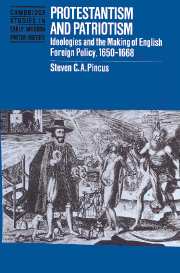Book contents
- Frontmatter
- Contents
- Acknowledgments
- List of abbreviations
- 1 Introduction
- Part I The rod of the Lord: ideology and the outbreak of the First Anglo-Dutch War
- 2 Historiographical overview
- 3 The attempt at unification
- 4 The road to war
- Part II To unite against the common enemy: the 1654 Treaty of Westminster and the end of apocalyptic foreign policy
- Part III Popery, trade, and universal monarchy: ideology and the outbreak of the Second Anglo-Dutch War
- Part IV The Medway, Breda, and the Triple Alliance: the collapse of Anglican Royalist Foreign Policy
- Conclusion
- Bibliography
- Index
- Titles in the series
2 - Historiographical overview
Published online by Cambridge University Press: 01 October 2009
- Frontmatter
- Contents
- Acknowledgments
- List of abbreviations
- 1 Introduction
- Part I The rod of the Lord: ideology and the outbreak of the First Anglo-Dutch War
- 2 Historiographical overview
- 3 The attempt at unification
- 4 The road to war
- Part II To unite against the common enemy: the 1654 Treaty of Westminster and the end of apocalyptic foreign policy
- Part III Popery, trade, and universal monarchy: ideology and the outbreak of the Second Anglo-Dutch War
- Part IV The Medway, Breda, and the Triple Alliance: the collapse of Anglican Royalist Foreign Policy
- Conclusion
- Bibliography
- Index
- Titles in the series
Summary
The victory at Dunbar on 3 September 1650 convinced the English in general and members of the Rump in particular that God had not forsaken England, making it possible for them to look beyond the problems of the British Isles. Since the days of Elizabeth the United Provinces of the Netherlands had appeared to many in England as their natural ally. Yet the foreign-policy wishes of the Stuarts and then the antagonistic attitude adopted by the Princes of Orange had dashed their hopes. By the end of 1650, however, the Stuart monarchy was ostensibly banished from England forever and William II, Prince of Orange, was dead leaving only a posthumous son to carry on the Orange line. The English Commonwealth consequently seized upon the opportunity, despatching two of its most eminent statesmen, Walter Strickland and Oliver St. John, to The Hague in the early spring of 1651. Their purpose, Oliver St. John told the General Assembly of the States General, was “to enter into a more intimate alliance, and nearer union” with the Dutch “whereby a more real and intrinsical interest of each other may be contracted for their mutual good.” The English people were kept informed of the initially triumphant progress of their extraordinary ambassadors by means of a variety of pamphlets and newspapers. These reminded the English of the variety of Dutch virtues, claiming for example that the United Provinces is “such a glorious State” which “for plenty, riches, and policy, hath preeminence of all the monarchies in Europe.” Unlike modern historians, contemporaries did not see the mission as a Utopian fantasy.
- Type
- Chapter
- Information
- Protestantism and PatriotismIdeologies and the Making of English Foreign Policy, 1650–1668, pp. 11 - 14Publisher: Cambridge University PressPrint publication year: 1996



